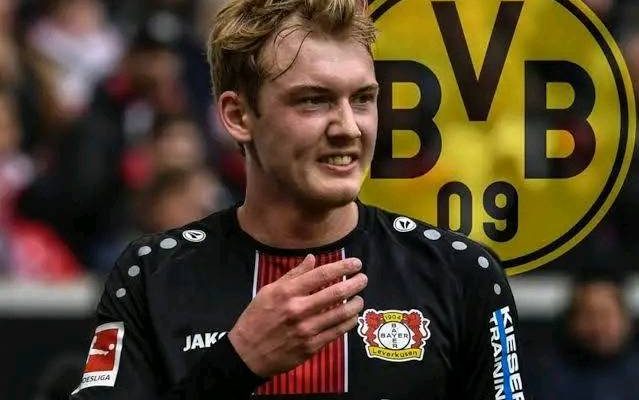The news hit like an earthquake across German football, shaking not only Leverkusen but the entire Bundesliga landscape. Julian Brandt, the prodigal son of Bayer 04, is on his way back to the BayArena. After years of dazzling performances in the black-and-yellow jersey of Borussia Dortmund, the versatile playmaker and creative force has decided to return to the club where he first made his name, igniting emotions that words can hardly capture. For many Leverkusen fans, it feels like a dream they once gave up on, now suddenly becoming reality. For Brandt himself, it is the continuation of a journey that began when he was still a teenager, carving out his reputation as one of Germany’s brightest attacking talents.
The emotional pull of this transfer is immense. Brandt was not just another talented youngster who passed through Leverkusen; he was the embodiment of their philosophy, a player who carried the ball with elegance, vision, and a touch of magic that made supporters rise from their seats. From his first explosive seasons in the Bundesliga to his final games before departing for Dortmund in 2019, he left a mark that could never be erased. His assists were often works of art, threading impossible passes between defensive lines, and his goals had a signature mix of composure and flair. When he chose to leave for Dortmund, fans understood the ambition but felt the sting of losing one of their own. Many feared that chapter was closed forever. Yet here we are, years later, with the script rewritten.
This homecoming is about more than footballing ability—it is about emotion, loyalty, and a sense of destiny. Supporters see Brandt’s return as a signal that Bayer 04 is not only serious about fighting at the highest level in the Bundesliga and Europe but also capable of building squads with both heart and quality. Bringing him back is a statement, a declaration that the club will not be satisfied with fleeting successes or temporary brilliance. Instead, they are aiming for consistency, identity, and a long-term push among Germany’s elite.
From a tactical perspective, the signing is a masterstroke. Brandt has matured enormously during his Dortmund years. At the Signal Iduna Park, he was sometimes questioned for inconsistency, but under several coaches, he learned to refine his game. He became more complete, adding defensive work rate and positional intelligence to his natural creativity. The Julian Brandt returning to Leverkusen is no longer the wide-eyed talent who relied solely on instinct; he is now a battle-tested professional, experienced in Champions League duels, capable of controlling games, and equipped with the resilience required at the very top level. For Bayer’s coach, this is a dream signing. He can play as a winger, an advanced midfielder, or even as a deeper playmaker, offering flexibility that can transform the dynamics of the entire team.
The fans are electrified. On social media, the announcement has caused a storm. Videos of his best goals in a Leverkusen shirt are circulating again—long-range screamers, clever dribbles, and breathtaking assists that still live in the memory. Chants of his name have already been heard at the BayArena, even before his official presentation. For supporters, this is not just another signing; it is a reunion with a player who represents their footballing identity. There is pride in seeing Brandt wear their colors again, and there is hope that his return will inspire the next generation of talents within the club’s youth system.
Experts have been quick to call this one of the most sensational transfers of recent Bundesliga history. In an era where top players often move abroad, the return of a German international to his former club feels almost romantic. It is the kind of storyline that fans dream of, but rarely get to see unfold. Many pundits agree that Brandt could be the missing piece in Leverkusen’s push to finally secure silverware. The club has come close in recent years but often lacked that extra spark of creativity in key matches. With Brandt pulling the strings, they now possess the kind of playmaker who can unlock defenses in tight games, provide calm under pressure, and deliver moments of brilliance when most needed.
For Brandt himself, this move is deeply symbolic. At Dortmund, he enjoyed moments of success but never truly escaped the shadow of bigger names or the burden of expectations that came with replacing departed stars. At Leverkusen, however, he is coming home. He knows the city, the fans, the environment—and most importantly, he knows that here he is cherished not just for his talent but for what he represents. This is his stage, his family, his club. The decision to return signals that Brandt is seeking more than trophies; he is seeking belonging, a place where his football can flourish in harmony with his emotions.
The timing of the move could not be better. Leverkusen is building a squad that blends youth with experience, flair with stability. Brandt fits perfectly into this vision. He brings leadership to a young dressing room, while also connecting with seasoned professionals who understand the demands of top-level competition. His experience with the German national team adds another layer of value. Few clubs in the Bundesliga can boast such a combination of raw potential and proven quality.
Financially, this transfer also carries weight. To lure a player of Brandt’s caliber back home, Leverkusen had to convince him not only with money but also with a vision. It shows that the club has grown in stature and ambition. Where once players like Brandt might have left and never looked back, now they see Leverkusen as a serious destination, capable of competing with Germany’s biggest clubs. This shift is monumental and could have ripple effects across the league, with other talents reconsidering their options in the face of Leverkusen’s new power.
There is also a psychological dimension to this story. For years, Leverkusen has fought against the label of “nearly men”—a club that plays beautiful football, produces incredible talents, but falls just short of ultimate glory. The return of Brandt symbolizes a break from that narrative. It is a bold reminder that the club is capable of writing its own destiny, reclaiming its icons, and building something lasting. Fans believe this could be the beginning of a golden era, where the balance between style and success is finally achieved.
Of course, with great emotion comes great expectation. Brandt will face pressure to deliver immediately. Every pass, every shot, every performance will be scrutinized. Yet, those who know him understand that pressure has always been a part of his career. He thrives when the spotlight is brightest, and with the support of fans who adore him, there is every reason to believe he will rise to the occasion.
The Bundesliga as a whole benefits from this move. In a league that has sometimes been criticized for losing its stars to foreign markets, the return of a national team player to his roots adds prestige and narrative depth. It gives fans across Germany another reason to watch, to debate, to anticipate the clashes where Brandt will once again face Dortmund, Bayern, and other rivals—but this time in the red and black of Leverkusen. Those duels will carry extra drama, with the story of the lost son now written into every confrontation.
Looking ahead, the potential impact is enormous. Leverkusen, already a dangerous side, could become one of the most feared attacking forces in Europe with Brandt orchestrating play. His connection with strikers and wingers will be crucial, and his ability to change the rhythm of games could be the difference between good seasons and historic ones. Fans are already dreaming of Champions League nights at the BayArena, with Brandt leading the charge against Europe’s elite.
Ultimately, Julian Brandt’s homecoming is not just a football transfer—it is a cultural event, a story of belonging, ambition, and renewal. It reminds us why football is more than a game: because it carries the power of memory, identity, and emotion. When Brandt steps onto the pitch in Leverkusen colors once again, the roar of the crowd will not just be for a player—it will be for a story completed, a circle closed, a dream reborn.
The Bundesliga trembles, the BayArena pulses with anticipation, and Bayer Leverkusen embraces the return of its prodigal son. The journey continues, the magic returns, and the future shines brighter than ever with Julian Brandt back where he belongs.



